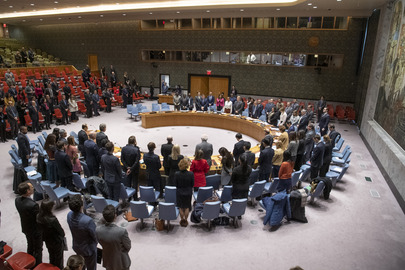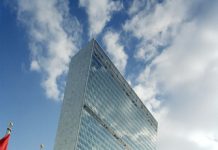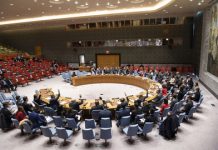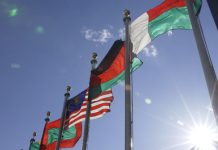Head of the World Health Organization (WHO) Dr Tedros Adhanom Ghebreyesus announced that first responders from the UN agency were already “on the ground” to support care for the injured.
The UN World Food Programme (WFP) also highlighted its support for affected communities and the emergency response as needs appraisals began.
Reports indicate that the earthquake struck near the city of Mazar-i-Sharif at around 1am local time, causing buildings to collapse on those sleeping inside.
Footage posted on social media from the city’s Shrine of Hazrat Ali – also known as the Blue Mosque – showed people stepping around rubble on the ground of the site revered by Shiah Muslims.
Although people have been reported killed in the worst-hit mountainous province of Samangan, initial assessments carried out from the air indicated fewer signs of damage than at first feared.
The UN flyover, conducted with the help of the Swiss authorities, also showed no signs of mass displacement that might have been expected had the earthquake been more destructive.
“We went over the main populated areas where the most settlements are in the earthquake affected area.
“Thankfully, we saw very little widespread devastation…compared to the devastating scenes we saw in Kunar just a few weeks ago,” said Richard Trenchard, the UN’s acting Humanitarian Coordinator in Afghanistan.
Still reeling from Kunar quake
The new crisis follows a magnitude 6.0 earthquake on 31 August that swept away thousands of houses and vital infrastructure in eastern Afghanistan’s Kunar province. The disaster uprooted hundreds of thousands of people and left half a million requiring urgent medical assistance.
The Shrine of Hazrat Ali in Mazar-i-Sharif reportedly sustained damage.
“What began as an acute emergency has now evolved into a displacement crisis, where families endure extended stays in temporary settlements amid escalating health risks,” WHO said.
In addition to a lack of access to safe drinking water for displaced families, the UN agency warned of widespread open defecation and poor access to health services for women in particular, owing to “the absence of female staff and the lack of privacy”.
Maternal and newborn health needs remain critical for those impacted by the August quake amid deep funding cuts for aid work, WHO noted, in addition to immunization, noncommunicable disease case management and mental health and psychosocial support.
On the ground in Afghanistan, UN agencies and partners say that collaboration and local leadership will be crucial to boost the recovery response.
Efforts are underway to pre-position supplies, mobilize surveillance teams to prevent disease outbreaks and prepare damaged hospitals to resume operations.
Building back better
Afghanistan is prone to earthquakes because it sits on numerous tectonic fault lines that often cause massively damaging shallow tremors.
To improve the resilience of vulnerable communities to these repeated shocks, specialized UN agency UN Habitat said trained Afghan masons using local construction techniques, are one important way to help save lives.
“While everybody is still assessing the impact of the earthquake, looking at casualties, it is important that people become aware that earthquakes will happen in Afghanistan again and again,” said the agency’s Stephanie Loose, Senior Human Settlements Officer.
“It’s important to look at materials, but also construction methods that are intrinsic to the cultural heritage of the country,” Ms.Loose added. “Bringing in new materials and construction methods which are not close to the people and where people cannot be trained en masse is not going to help the country. We need to act now and make sure that the cultural heritage is preserved regarding the settlement structures when rebuilding.”
Source of original article: United Nations (news.un.org). Photo credit: UN. The content of this article does not necessarily reflect the views or opinion of Global Diaspora News (www.globaldiasporanews.net).
To submit your press release: (https://www.globaldiasporanews.com/pr).
To advertise on Global Diaspora News: (www.globaldiasporanews.com/ads).
Sign up to Global Diaspora News newsletter (https://www.globaldiasporanews.com/newsletter/) to start receiving updates and opportunities directly in your email inbox for free.



























